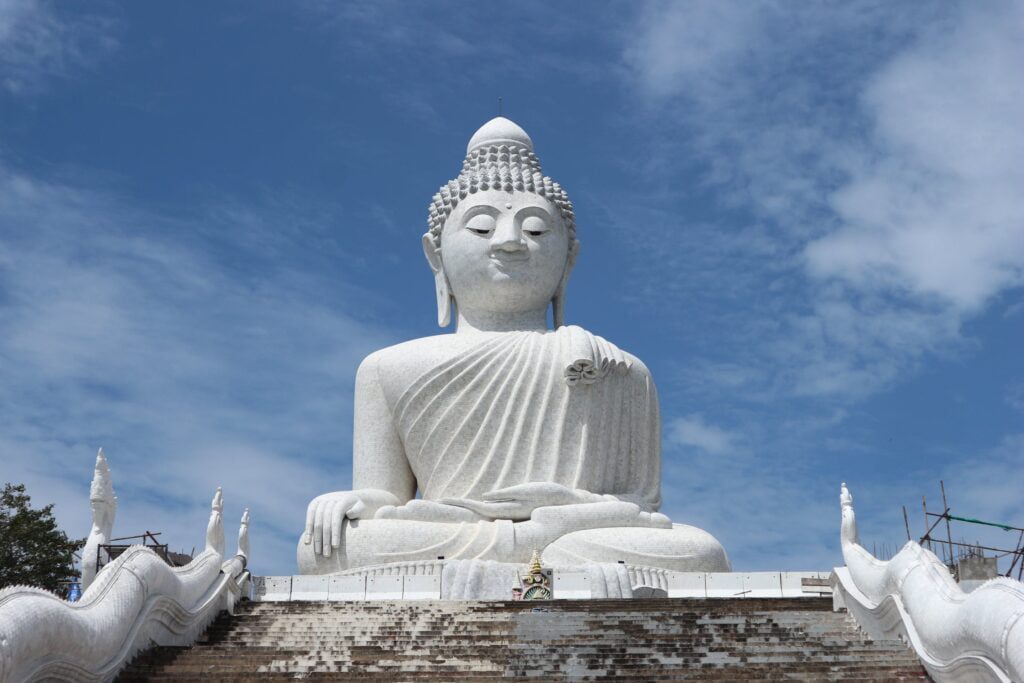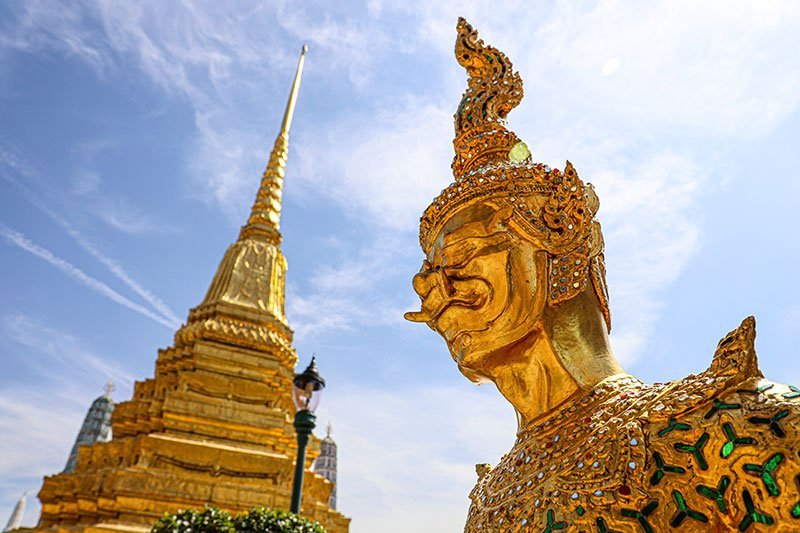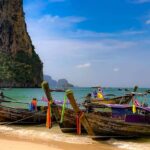Table of Contents
Thailand is a tropical paradise that attracts millions of visitors every year. But what if you could do more than just visit? What if you could live and work in Thailand as a digital nomad?
As a digital nomad, you have the freedom to work from anywhere in the world, as long as you have a laptop and an internet connection. You can choose your own schedule, set your own goals, and explore new cultures and experiences.
But where should you go as a digital nomad? How do you find the best places to live, work, and play? How do you deal with the practical aspects of visas, accommodation, and transportation?
In this guide, we will answer all these questions and more. We will show you why Thailand is one of the best countries for digital nomads, and how you can make the most of your time there. We will also share some tips and resources to help you plan your trip and enjoy your stay.
Whether you are a seasoned digital nomad or a newbie looking for a change of scenery, this guide is for you. Read on to find out how to embrace the digital nomad lifestyle in Thailand.
How to Live Affordably in Thailand as a Digital Nomad
One of the main reasons why Thailand is a popular choice for digital nomads is its low cost of living. You can enjoy a high quality of life in Thailand without spending a fortune. You can eat delicious meals at local restaurants for just a few dollars, get around easily with public transportation or cheap taxis, and find accommodation that suits your budget and preferences.
Of course, the cost of living in Thailand depends on several factors, such as your location, lifestyle, and personal needs. Some places are more expensive than others, especially if they are tourist hotspots or have a high demand for housing. For example, you can expect to pay more for rent and food in Phuket or Koh Samui than in Bangkok or Chiang Mai.
To save money in Thailand, you can follow some simple tips, such as:
- Shop at local markets or supermarkets instead of convenience stores or imported goods shops.
- Eat at street stalls or small eateries instead of fancy restaurants or fast food chains.
- Use public transportation or rent a scooter instead of taking taxis or tuk-tuks.
- Negotiate prices for goods and services, especially in tourist areas or markets.
- Avoid peak seasons or holidays, when prices tend to go up.
According to Nomad List, the average cost of living in Thailand for a digital nomad is $1,261 per month, which includes rent, food, transportation, entertainment, and other expenses. However, this can vary depending on your personal situation and preferences. You can use online tools like Numbeo or Expatistan to compare the cost of living in different cities and regions in Thailand.

How to Stay Connected and Productive in Thailand as a Digital Nomad
As a digital nomad, you need reliable and fast internet access to work remotely and stay in touch with your clients, colleagues, and family. Fortunately, Thailand has excellent internet connectivity, with an average speed of 35.94 Mbps, according to Speedtest. You can easily find Wi-Fi hotspots in most cafes, co-working spaces, hotels, and other public places.
However, not all Wi-Fi networks are created equal. Some may be slow, unstable, or insecure. To avoid any issues, you should always have a backup plan, such as a mobile hotspot or a local SIM card. You can buy a prepaid SIM card from one of the main providers in Thailand, such as AIS, DTAC, or TrueMove, and get a data plan that suits your needs. You can also use a VPN to protect your online privacy and security, especially when using public Wi-Fi.
Another important aspect of working remotely in Thailand is finding a suitable workspace. While you can work from your accommodation or a cafe, you may prefer a more professional and comfortable environment. That’s where co-working spaces come in handy. Co-working spaces are shared offices where you can rent a desk, a private room, or a meeting room, and enjoy various amenities, such as high-speed internet, printers, scanners, coffee, snacks, and more.
Thailand has a thriving co-working scene, especially in cities like Bangkok and Chiang Mai, where you can find dozens of co-working spaces to choose from. Some of the most popular ones are Hubba, The Hive, Punspace, and CAMP. Co-working spaces are not only great for working, but also for networking and socializing with other digital nomads and entrepreneurs. You can join events, workshops, and meetups, and learn from the local and international community.
How to Experience the Culture and Nature of Thailand as a Digital Nomad
Living in Thailand is not only about work; it’s also about enjoying the culture and nature of this amazing country. Thailand has a rich and diverse heritage, with influences from Buddhism, Hinduism, and other religions and ethnic groups. You can explore the history and traditions of Thailand by visiting its temples, museums, palaces, and monuments, and by participating in its festivals, ceremonies, and rituals.
Some of the cultural highlights of Thailand include:
- The Grand Palace and Wat Phra Kaew, the most sacred temple in Thailand, are located in Bangkok.
- Wat Pho, the temple of the reclining Buddha, and Wat Arun, the temple of dawn, are also in Bangkok.
- The ancient city of Ayutthaya, a UNESCO World Heritage Site, with its ruins and temples.
- The historic town of Chiang Mai, with its old city walls, moat, and hundreds of temples.
- The Golden Triangle, where the borders of Thailand, Laos, and Myanmar meet, and where you can learn about the opium trade and the hill tribes.
- The Songkran Festival, the Thai New Year, is celebrated in April with water fights and festivities.
- The Loy Krathong Festival, the festival of lights, is celebrated in November with floating lanterns and offerings.
- The Yi Peng Festival, the lantern festival, is celebrated in Chiang Mai with thousands of sky lanterns.
Thailand is also blessed with natural beauty, with stunning landscapes that range from mountains and jungles to beaches and islands. You can enjoy various outdoor activities, such as hiking, biking, kayaking, rafting, diving, snorkeling, surfing, and more. You can also visit national parks and wildlife sanctuaries, where you can see elephants, tigers, monkeys, and other animals.
Some of the natural highlights of Thailand include:
- The islands of Phuket, Koh Samui, Koh Phi Phi, Koh Lanta, Koh Tao, and Koh Chang, with their white sand beaches, turquoise waters, and coral reefs.
- The Khao Sok National Park, with its rainforest, limestone cliffs, caves, and lakes.
- The Doi Inthanon National Park, with its highest peak in Thailand, waterfalls, and pagodas.
- The Erawan National Park, with its seven-tiered waterfall and emerald pools.
- The Chiang Mai Elephant Sanctuary, where you can interact with rescued elephants in an ethical way.
- The Tiger Kingdom, where you can get close to tigers of different sizes and ages.

How to Stay Healthy and Safe in Thailand as a Digital Nomad
Thailand is generally a safe and healthy country for travelers and digital nomads, but it’s always good to take some precautions. You should always have travel insurance that covers medical emergencies, as well as theft and loss of belongings. You should also stay updated on any travel advisories and be aware of your surroundings, especially in crowded or touristy areas.
Some of the health and safety tips for Thailand are:
- Get vaccinated for common diseases, such as hepatitis A, typhoid, tetanus, and rabies.
- Avoid drinking tap water or ice, and drink bottled water or filtered water instead.
- Be careful with street food, and only eat at places that look clean and busy.
- Protect yourself from mosquitoes, and use repellent, nets, and long clothes.
- Be aware of the risk of malaria, dengue, and Zika, and consult a doctor if you have any symptoms.
- Wear sunscreen, sunglasses, and a hat, and stay hydrated in the hot and humid climate.
- Respect the local laws and customs, and avoid any political or religious discussions or protests.
- Beware of scams, pickpockets, and touts, and keep your valuables safe and hidden.
- Drive carefully, and wear a helmet if you rent a scooter or a bike.
- Avoid drugs, gambling, and prostitution, as they are illegal and can lead to serious consequences.
How to Enjoy the Digital Nomad Lifestyle in Thailand
Thailand is one of the best countries for digital nomads, as it offers a perfect balance of work and play. You can work remotely from anywhere in the country, and enjoy the culture and nature of this amazing place. You can also meet other digital nomads and entrepreneurs, and learn from the local and international community.
To make the most of your digital nomad experience in Thailand, you should:
- Do your research and plan ahead, and choose the best visa, accommodation, and workspace options for your needs
- Be flexible and adaptable, and embrace the challenges and opportunities of living in a different country.
- Be respectful and friendly, and learn some basic Thai phrases and etiquette.
- Be curious and adventurous, and explore the history and traditions of Thailand.
- Be active and healthy, and enjoy the outdoor activities and natural beauty of Thailand.
- Be social network, and connect with other digital nomads and entrepreneurs.
- Thailand is a wonderful place to live and work as a digital nomad, and we hope this guide has helped you prepare for your trip and stay. We wish you a happy and successful digital nomad journey in the Land of Smiles! 😊
Frequently Asked Questions about Being a Nomad in Thailand
What is the best time to visit Thailand as a digital nomad?
The best time to visit Thailand as a digital nomad depends on your preferences and the region you want to explore. Generally, the cool and dry season from November to February is the most popular and comfortable time to visit, as the weather is pleasant and there are many festivals and events. However, this is also the peak season, which means higher prices and more crowds.
The hot season from March to May is good for enjoying the beaches and islands, but it can be very hot and humid. The rainy season from June to October is the low season, which means lower prices and fewer tourists, but it can also mean heavy rains and storms, especially in the south.
How can I get a visa to stay in Thailand as a digital nomad?
There are several visa options for digital nomads who want to stay in Thailand for an extended period. The most common one is the Tourist Visa, which allows you to stay for up to 60 days and can be extended for another 30 days at a local immigration office. You can apply for this visa at a Thai embassy or consulate in your home country or online.
Another option is the Education Visa, which requires you to enroll in a language school or a course in a Thai university, and allows you to stay for up to 90 days and can be extended for up to one year. You can also apply for this visa at a Thai embassy or consulate in your home country or online. A third option is the Non-Immigrant Visa, which is similar to the Education Visa, but requires you to have a sponsor, such as a company, an organization, or a family member in Thailand. You can apply for this visa at a Thai embassy or consulate in your home country.
How can I find accommodation in Thailand as a digital nomad?
Thailand offers a wide range of accommodation options for digital nomads, from luxury condos to cozy bungalows. You can find short-term accommodation on platforms like Airbnb, Booking.com, and Agoda, where you can compare prices, locations, and reviews.
For longer stays, you can contact local real estate agents or expat communities, where you can often find affordable long-term rental options. You can also consider co-living spaces or shared apartments, which can help you save costs and meet other digital nomads.
How can I meet other digital nomads in Thailand?
Thailand has a large and active digital nomad community, especially in cities like Bangkok and Chiang Mai. You can meet other digital nomads in co-working spaces, cafes, bars, and events.
You can also join online platforms and groups, such as Nomad List, Facebook, Meetup, and Reddit, where you can find information, tips, and invitations to socialize and network with other digital nomads.
What are the challenges of being a digital nomad in Thailand?
Being a digital nomad in Thailand can be an amazing experience, but it also comes with some challenges. Some of the common challenges are:
– Cultural differences: Thailand has a different culture and etiquette than Western countries, and you may encounter some misunderstandings or difficulties in communication, especially with the language barrier. You should respect the local customs and laws, and learn some basic Thai phrases and gestures.
– Internet reliability: Thailand has good internet connectivity, but it can also be slow, unstable, or insecure at times. You should always have a backup plan, such as a mobile hotspot or a local SIM card, and use a VPN to protect your online privacy and security.
– Visa issues: Thailand has strict visa rules and regulations, and you may face some hassles or fines if you overstay or violate your visa conditions. You should always keep track of your visa status and expiry date, and renew or extend your visa on time.
– Health risks: Thailand has some health risks, such as tropical diseases, food poisoning, and air pollution. You should get vaccinated, avoid drinking tap water or ice, protect yourself from mosquitoes, and wear sunscreen and a mask. You should also have travel insurance that covers medical emergencies.
Living in Thailand as a Digital Nomad – My HONEST Thoughts After 5 Months
Useful links to Government websites from Thailand:
- Royal Thai Government: This is the official website of the Thai government that provides the latest news, announcements, and measures on various topics, such as COVID-19, flood prevention, and Thai culture.
- Ministry of Foreign Affairs of the Kingdom of Thailand: This is the official website of the Thai Ministry of Foreign Affairs that offers information on visa requirements, travel advisories, consular services, and bilateral relations of Thailand with other countries.
- Tourism Authority of Thailand: This is the official website of the Tourism Authority of Thailand that promotes Thailand as a tourist destination and provides information on the attractions, events, festivals, and activities in different regions of Thailand.
Keywords related to this article: #DigitalNomadLife #WorkFromAnywhere #NomadCommunity #NomadDestinations #NomadTools



